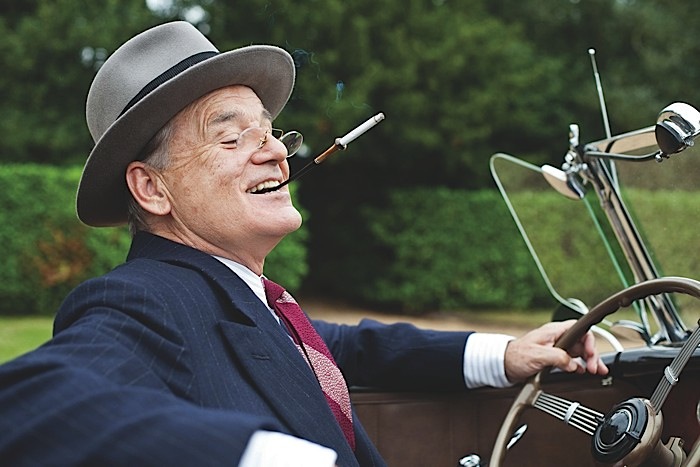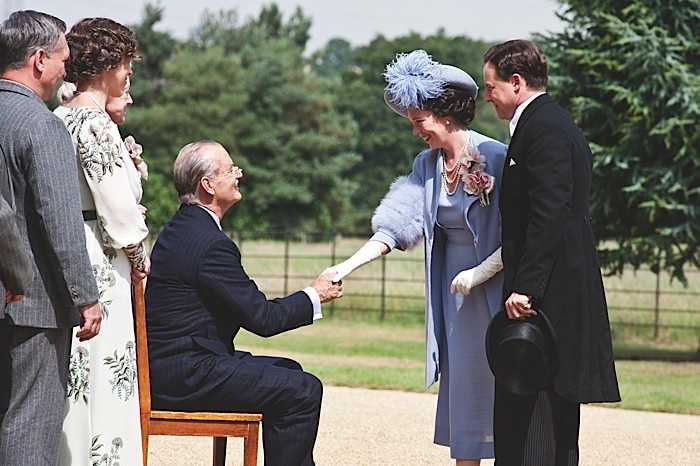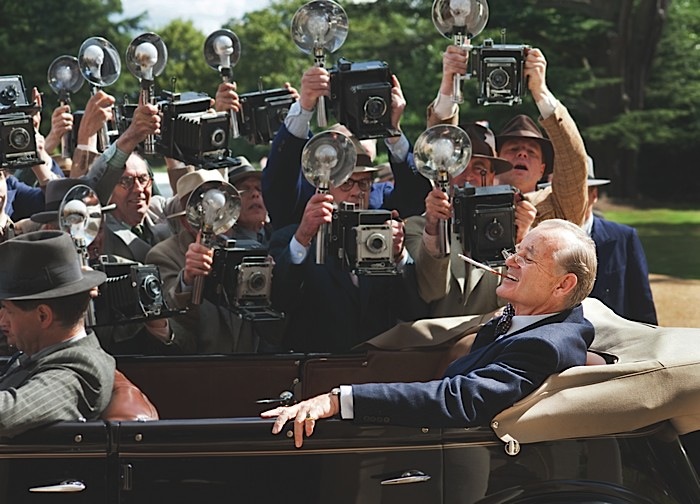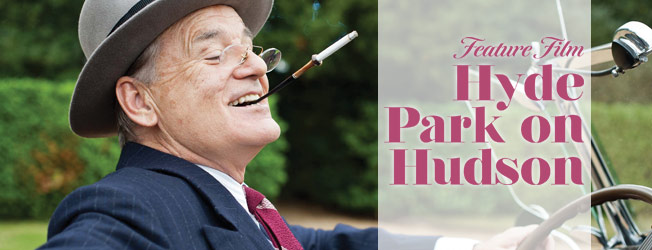Meet the cast and crew of Hyde Park on Hudson, hitting cinemas on March 28th. They tell The Retiree what makes this new feature film so special, as modern cinematography meets old-world charm.

Bill Murray stars as FDR in Roger Michell’s historical tale Hyde Park On Hudson, a Focus Features release. Credit: Nicola Dove

(l to r) Bill Murray as FDR, Olivia Colman as Elizabeth and Samuel West as Bertie in Roger Michell’s historical tale Hyde Park On Hudson, a Focus Features release. Credit: Nicola Dove
In June 1939, President Franklin Delano Roosevelt (Academy Award® nominee Bill Murray) and his wife Eleanor (Olivia Williams) host the King and Queen of England (Samuel West and Olivia Colman) for a weekend at the Roosevelt home at Hyde Park on Hudson, in upstate New York – the first-ever visit of a reigning English monarch to America.
With Britain facing imminent war with Germany, the Royals are desperately looking to FDR for support. But international affairs must be juggled with the complexities of FDR’s domestic establishment, as wife, mother, and mistresses all conspire to make the royal weekend an unforgettable one.
Seen through the eyes of Daisy (Academy Award nominee Laura Linney), Franklin’s neighbor and intimate, the weekend will produce not only a special relationship between two great nations, but, for Daisy – and through her, for us all – a deeper understanding of the mysteries of love and friendship.
Here is what the cast and crew had to say about this incredible event – and the film that has tried to capture both a historic event and romantic tale:
It was a time of history in the making, actress Laura Linney who plays Daisy in film says, “At the time of their visit to America, the royals were vulnerable.
There was anti-British feeling in the United States. It was the first time that British royalty had set foot in the United States. Given the two countries’ histories, this was a big deal.”
Samuel West playing the King of England, Bertie, says “They’d had that spot of bother two centuries earlier, and nobody had gone back… but the unthinkable, the Second World War, was about to happen, and Britain needed to know if it had an ally in America.”
Dominating the screen is movie legend Bill Murray, who plays U.S. President Franklin Delano Roosevelt [FDR] in the film, told The Retiree, “It was brave of the King and Queen to come and put themselves at the mercy of the American populace – to let themselves be gawked at, touched, and spoken about.
They had to bring the idea to the American people of conceivably joining them in the war, but make it as if they were neighbors coming over because they needed a cup of sugar. They changed what people thought the royal family was about.”
“I couldn’t get enough of Elizabeth Wilson,” Murray went on to say. “She’s got a million stories; ‘Okay, about Jason Robards…’ Roosevelt’s mother was a strong woman, and Elizabeth is old enough to be my mother. So when Olivia Williams was playing scenes as Eleanor with her, there was definite subtext; everyone had to defer.”
When asked about the film itself, Hyde Park on Hudson, Murray said “Roosevelt is the most formidable character I’ve ever been asked to play, and this story that I hadn’t known about showed his personal side. There was a humanity to Richard’s script.
After I read the script, I called up [director/producer] Roger Michell and we had more conversations on the phone. He then said, “I’ll come visit you [in America],” and we went to the beach and kept talking about what we could do with this story.”
“When you read Daisy’s letter and diary, you see what Roosevelt shared with her as someone who he could trust completely to be supportive. There were moments when his job had to be the loneliest in the world.
“Top Cottage was built with his post-politics life in mind. But that never got to happen; it was two terms [as president], then three, then a fourth. He died on the world stage, with America a different country in 1945 than it was in 1933.
I envy his kind of courage.”
West, who plays Bertie, spent a lot of time studying that period of time. “I read biographies of Bertie and Elizabeth, and dipped into a couple of ones on Roosevelt. Eleanor Roosevelt said that Elizabeth would smile or wave at a crowd and everybody would think that the smile or wave was just for them,” he says.
“These two had spent years thinking, well, I’m not going to be Queen, or King. It could have all been so different with Edward VIII [if he had remained King]… Bertie’s back was against the wall. One of the reasons he took the name King George VI was to name himself after his grandfather, to ensure continuity. He told Winston Churchill that he hoped he would reign long enough to make things good again. The trip was important for the country, but also for the institution of the monarchy.”
Olivia Colman, who plays the Queen of England, Elizabeth, in the film, told The Retiree, “Sam and I talked about how the King and Queen were this young couple with so much pressure on them, having to go and try to win over the Americans.
“Roosevelt is the most formidable character I’ve ever been asked to play…”
Bill Murray
“Elizabeth was dealing with cruel remarks comparing her unfavorably to Wallis Simpson [for whom King Edward VIII had forsaken the throne]; she had lost weight for the trip. All eyes were on them – not just their country’s, but also the American publics’.”

Bill Murray (r) stars as FDR in Roger Michell’s historical tale Hyde Park On Hudson, a Focus Features release. Credit: Nicola Dove
When asked why she chose to take on the role of Daisy in Hyde Park on Hudson, Linney said; “I’ve always had a deep fascination with the Roosevelts, particularly Eleanor, and their era. I’ve visited Hyde Park many times. But I knew nothing about Daisy Suckley. When this script came along, I felt grateful that this movie was getting made at all.
“By 1939, Daisy’s family had lost a good deal of their money. Her father had passed away, and she had a number of siblings, so Daisy became responsible for the family. Daisy went to go work for her aunt [Mrs. Woodbury Langdon] as a secretary and paid companion. The small amount of money that she made was handed back to her family to help keep their home – the large mansion they lived in – going.
“I spent a little time on the property, with its entire history of Daisy’s family, and was able to learn about her and her disposition. I visited her bedroom. I saw the books on her bookshelf, and got a sense of her interests.”
An inspiring character is FDR’s mother, Sara Delano Roosevelt, played by Elizabeth Wilson, actress. When asked about her character, Wilson says, “I was very proud to play [FDR’s mother] Sara Delano Roosevelt. Her family went through a lot, physically, emotionally – and they would have had more trouble financially, but she had a good deal of money. Things might not have happened the same way for Franklin if it hadn’t been for her willingness to support them.
“I feel that Sara knew what was going on, and that she could handle it. Franklin was her one child, and she loved him so much.”
Elizabeth Marvel, (who plays FDR’s secretary, Missy) believes that “So many American presidents – Bill Clinton, Barack Obama, FDR – have had profound relationships with their mothers. These women were dominant in their lives. Also, Eleanor was such a force for women’s rights.”
Because of this, playing the First Lady in this film was certainly no small feat, and Olivia Williams does so convincingly well. “I was playing a woman whose mother-in-law dominated… an extraordinary domestic set-up”, William says laughing.
“This is meant to be an illuminating story told affectionately, not washing dirty linen in public or diminishing anyone in the eyes of the world. Facts have come to light over the years about some of these leaders’ domestic realities; I think people will be interested, entertained, and surprised”, she went on to say.
The final words were left to Bill Murray, who summed up the powerful woman by saying, “I think of how she impressed Admiral Halsey, who commanded the Pacific, with what she did in World War II, going out to visit the troops and being a representative for the Red Cross.
I feel that at the heart of FDR and Eleanor’s relationship was the education which formed them. He was taught to be fearless, and Eleanor had that famous quote; “Do one thing every day that scares you.” At the dinner table, growing up, they were told that they had to accomplish something.
They weren’t a traditional husband and wife. They both knew that they were about something else, that they could better achieve what they each had to do by staying with each other and working with each other.”























Add Comment